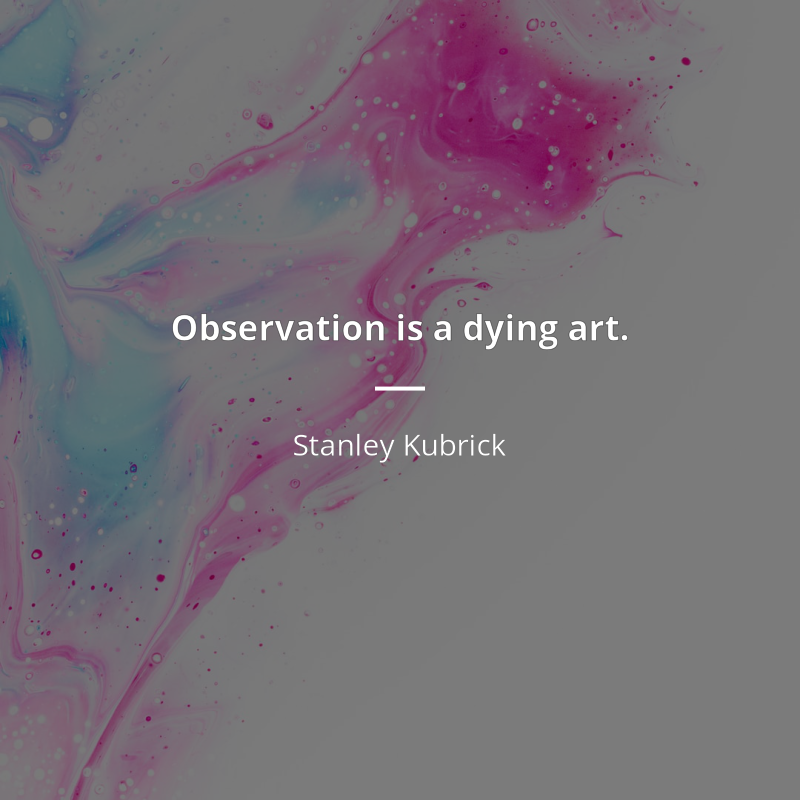Frases célebres de Stanley Kubrick
Fuente: «Kubrick: Inside a Film Artist's Maze» de Thomas Allen Nelson, p.10.
En su discurso al obtener el premio D.W. Griffiths Lifetime Achievement (1999)
Fuente: «Kubrick: Inside a Film Artist's Maze» de Thomas Allen Nelson, p.17.
“Ningún crítico me ha aclarado jamás ningún aspecto de mi trabajo.”
Fuente: «Los archivos personales de Stanley Kubrick» Taschen p.75 del texto de la traducción en español.
Stanley Kubrick: Frases en inglés

Fuente: Stanley Kubrick: Interviews
Quoted in Stanley Kubrick at Look Magazine (2013) by Phillipe Mather, p. 46
Contexto: I think the big mistake in schools is trying to teach children anything, and by using fear as the basic motivation. Fear of getting failing grades, fear of not staying with your class, etc. Interest can produce learning on a scale compared to fear as a nuclear explosion to a firecracker.
“Interest can produce learning on a scale compared to fear as a nuclear explosion to a firecracker.”
Quoted in Stanley Kubrick at Look Magazine (2013) by Phillipe Mather, p. 46
Contexto: I think the big mistake in schools is trying to teach children anything, and by using fear as the basic motivation. Fear of getting failing grades, fear of not staying with your class, etc. Interest can produce learning on a scale compared to fear as a nuclear explosion to a firecracker.
“The very meaninglessness of life forces man to create his own meaning.”
Quoted in Halliwell's Filmgoer's and Video Viewer's Companion (1988), p. 403. Seems that this sentence first appeared in an 1968 Playboy Interview "Stanley Kubrick on Mortality, the Fear of Flying, and the Purpose of Existence: 1968 Playboy Interview" http://www.brainpickings.org/2012/07/26/stanley-kubrick-playboy-interview/
Contexto: The very meaninglessness of life forces man to create his own meaning. If it can be written or thought, it can be filmed.
Quoted in Kubrick : Inside a Film Artist's Maze (2000) by Thomas Allen Nelson, p. 14
Contexto: I have always enjoyed dealing with a slightly surrealistic situation and presenting it in a realistic manner. I've always liked fairy tales and myths, magical stories. I think they are somehow closer to the sense of reality one feels today than the equally stylized "realistic" story in which a great deal of selectivity and omission has to occur in order to preserve its "realist" style.
Quoted in Eyes Wide Open: A Memoir of Stanley Kubrick (1999) by Frederic Raphael, p. 107
Interviewed by Charles Reynolds, Popular Photography (1960)
Video acceptance speech of the D.W. Griffiths Lifetime Achievement Award (1999) - video and transcript http://www.indelibleinc.com/kubrick/kubrick-dga.html
Quoted in Kubrick : Inside a Film Artist's Maze (2000) by Thomas Allen Nelson, p. 10
Interviewed by Charles Kohler, East Village Eye (1968)
“However vast the darkness, we must supply our own light.”
Interviewed by Eric Nordern, Playboy (September 1968); later published in Stanley Kubrick: Interviews (2001) http://books.google.com/books?id=iOU9bIlnPHIC&pg=PA73&lpg=PA73&dq=however+vast+darkness+supply+light&source=web&ots=WSx0cc_E1n&sig=OMT0-SOVCFtSN8a1WosgIR1PMWA
Contexto: The most terrifying fact about the universe is not that it is hostile but that it is indifferent; but if we can come to terms with this indifference and accept the challenges of life within the boundaries of death — however mutable man may be able to make them — our existence as a species can have genuine meaning and fulfillment. However vast the darkness, we must supply our own light.
“One man writes a novel. One man writes a symphony. It is essential that one man make a film.”
Quoted in The Edmonton Journal (8 March 1999), C3
"Kubrick on Barry Lyndon : An interview with Michel Ciment" (1982) http://www.visual-memory.co.uk/amk/doc/interview.bl.html
Quoted in Against the American Grain (1962) by Dwight Macdonald, p. 30
Interviewed by Eric Nordern, Playboy (September 1968)
